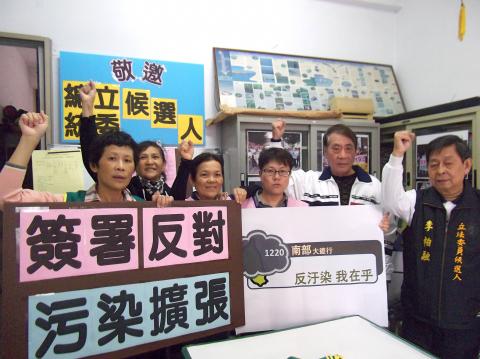Environmentalists yesterday accused the presidential candidates of paying insufficient attention to pollution issues in southern Taiwan, saying that they refused to sign a pledge drafted by environmental groups calling for the termination of energy and pollution-intensive development projects in southern municipalities.
A coalition of environmental groups sent the pledge to the Taipei headquarters of the Democratic Progressive Party (DPP), the Chinese Nationalist Party (KMT) and the People First Party (PFP) earlier this month.
They asked that the parties’ presidential and legislative candidates endorse a combination of proposals, including stopping the expansion of the Southern Taiwan Science Park in Tainan and Kaohsiung, the establishment of an oil refinery area in Kaohsiung and the expansion of China Steel Corp and the state-run oil refiner CPC Corp.

Photo: Taipei Times
Taiwan Water Resources Protection Union spokesperson Chen Jiau-hua (陳椒華) said that none of the presidential candidates signed the pledge, while only the DPP campaign office replied to the coalition’s proposals.
Chen said the response of the major parties was unsatisfactory.
Chen said that the DPP lacked a complete understanding of the environment in southern Taiwan, as the party, in its reply, said that the science park expansion projects would not add to air pollution or cause water shortages.
However, Chen said that the water shortage that farmers in Tainan experienced this year showed that there is no surplus water in the area for the park to utilize.
The DPP said it would strive to strike a balance between residential justice, environmental justice and industry justice when planning the oil refinery zone in Kaohsiung’s Siaogang District (小港), but Chen said that the party has ignored the fact that there is an active fault line in the district.
The city has already been designated as a class-three air quality zone — where the air pollution is most severe according to the Environmental Protection Administration’s three-class category — and has no capacity for oil refining, she said.
“Voters in southern Taiwan should cast their ballots for people willing to sign the pledge, instead of wasting their votes on the DPP or the KMT,” she added.
Tainan City Environmental Protection Alliance director Huang An-tiao (黃安調) was equally critical.
“Most legislative candidates of major parties did not sign the pledge or reply to the coalition’s proposals, or they made a uniform reply drafted by their parties. The cold shoulder response from the major parties shows that most candidates are not willing to take on environmental responsibility,” Huang said, questioning the eligibility of those candidates to represent their constituents.
Candidates of minority parties, such as the Green Party-Social Democratic Party Alliance, New Power Party and Trees Party, were more responsive and willing to sign the pledge, Huang said.
The coalition said it would launch an anti-pollution protest in Tainan on Sunday and called for candidates who have not yet signed the pledge to do so.

AGING: As of last month, people aged 65 or older accounted for 20.06 percent of the total population and the number of couples who got married fell by 18,685 from 2024 Taiwan has surpassed South Korea as the country least willing to have children, with an annual crude birthrate of 4.62 per 1,000 people, Ministry of the Interior data showed yesterday. The nation was previously ranked the second-lowest country in terms of total fertility rate, or the average number of children a woman has in her lifetime. However, South Korea’s fertility rate began to recover from 2023, with total fertility rate rising from 0.72 and estimated to reach 0.82 to 0.85 by last year, and the crude birthrate projected at 6.7 per 1,000 people. Japan’s crude birthrate was projected to fall below six,

US President Donald Trump in an interview with the New York Times published on Thursday said that “it’s up to” Chinese President Xi Jinping (習近平) what China does on Taiwan, but that he would be “very unhappy” with a change in the “status quo.” “He [Xi] considers it to be a part of China, and that’s up to him what he’s going to be doing, but I’ve expressed to him that I would be very unhappy if he did that, and I don’t think he’ll do that. I hope he doesn’t do that,” Trump said. Trump made the comments in the context

SELF-DEFENSE: Tokyo has accelerated its spending goal and its defense minister said the nation needs to discuss whether it should develop nuclear-powered submarines China is ramping up objections to what it sees as Japan’s desire to acquire nuclear weapons, despite Tokyo’s longstanding renunciation of such arms, deepening another fissure in the two neighbors’ increasingly tense ties. In what appears to be a concerted effort, China’s foreign and defense ministries issued statements on Thursday condemning alleged remilitarism efforts by Tokyo. The remarks came as two of the country’s top think tanks jointly issued a 29-page report framing actions by “right-wing forces” in Japan as posing a “serious threat” to world peace. While that report did not define “right-wing forces,” the Chinese Ministry of Foreign Affairs was

PREPAREDNESS: Given the difficulty of importing ammunition during wartime, the Ministry of National Defense said it would prioritize ‘coproduction’ partnerships A newly formed unit of the Marine Corps tasked with land-based security operations has recently replaced its aging, domestically produced rifles with more advanced, US-made M4A1 rifles, a source said yesterday. The unnamed source familiar with the matter said the First Security Battalion of the Marine Corps’ Air Defense and Base Guard Group has replaced its older T65K2 rifles, which have been in service since the late 1980s, with the newly received M4A1s. The source did not say exactly when the upgrade took place or how many M4A1s were issued to the battalion. The confirmation came after Chinese-language media reported